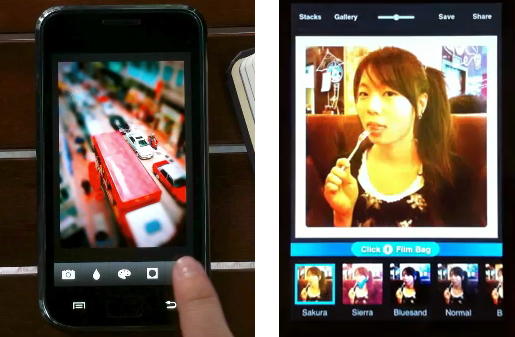JellyBus is a mobile app startup based in Seoul which has seen over 1,200,000 users in 16 different countries download the company’s iPhone camera app ‘qBro’ since its release in March last year. Another app, ‘MiniDSLR’ has also been a success and maintained a record 12 weeks as the top product on service provider SK’s T-Store.
Though it may hard to surmise just from the company’s name as to what JellyBus does, the secret to the company’s success has been in making camera apps which have better functions and efficiency than its rivals. CEO and founder of JellyBus Sejoong Kim, says that by not using the standard application programming interface, JellyBus has managed to cut image processing speeds to less than 0.5 of a second.

“Optimizing camera apps to support the various Android phones is a challenging task which gets harder with every new phone that comes out. “
This is one reason why the JellyBus team is recognized for their programming skills and product quality, not only by users but by the startup community internationally. This was proven by making it into the finals of Asia startup competition Echelon 2011 held in Singapore last year. JellyBus also managed to be listed as a “2011 Red Asia Finalist“, selected by editors at Red Herring.
JellyBus has several upcoming projects for 2012, and possibly the most important of these is the new Android image processing engine which is currently in development named ‘Juliet’.
“Rather than simply making new technology, we can now make apps more easily by having this engine, and in Android’s case it means we can achieve better optimization.”
Once complete, the company plans to release several apps which will be built around the engine. FX Photo Editor is an app which will utilize ‘Juliet’ and is due to be released on Android in March. FX Photo Editor will use HDR (High dynamic range imaging) technology which increases the accuracy of colors by using a wider range between light and dark colors. A photo app for the iPhone using HDR imaging is also in the works.

JellyBus develops apps for both iOS and Android platforms but has mainly leaned towards the smaller Android market rather than Apple’s booming App Store. Kim believes that this is to the company’s advantage.
“The value of doing well on the Android market is limitless, a smaller market can actually be more of an opportunity.”
Nevertheless the company believes that expanding its technology to Windows phones will be reasonably simple and even intends to enter the smart TV market in the second half of 2012. Other plans include developing video editing apps and expanding its products to other countries. Jellybus plans to enter international markets one at time using Android as its base. Having already entered the Japanese market via local app distributors NTT Docomo and AU One, the next market on the list is China and South-Asia.
The company has several other apps on the market including Tilt-Shift Maker, which lets users alter the focus and depth of photos to make certain objects stand out. Zolaman Robot Gunz is a children’s storybook made into a game and was released in the App Store last year. Some might think that JellyBus is perusing too many areas for a company with less than 10 employees but Kim thinks otherwise.
“There is a company overseas which is making trillions of won from just one camera application. JellyBus can do the same, not only with camera apps but with other types of apps too.”
You can view Jellybus’s website here and follow them on Twitter here.